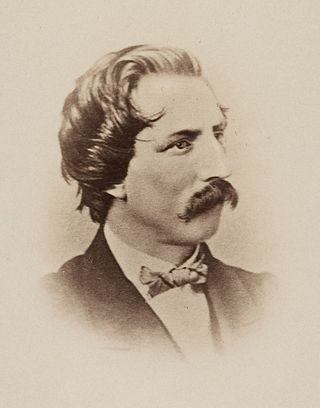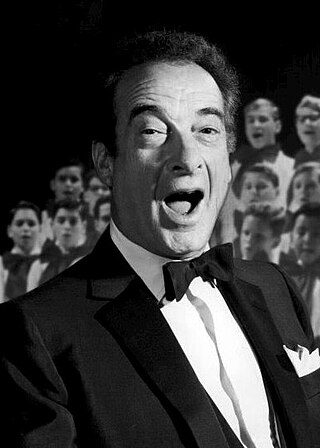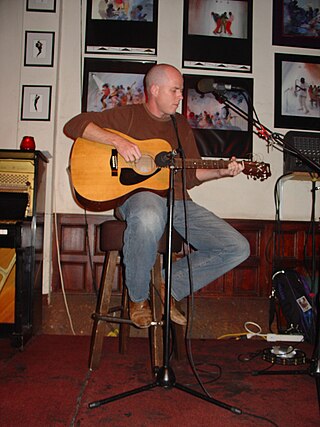
Charles Farrar Browne was an American humor writer, better known under his nom de plume, Artemus Ward, which as a character, an illiterate rube with "Yankee common sense", Browne also played in public performances. He is considered to be America's first stand-up comedian. His birth name was Brown but he added the "e" after he became famous.

Børge Rosenbaum, known professionally as Victor Borge, was a Danish-American pianist and comedian who achieved great popularity in radio and television in both North America and Europe. His blend of music and comedy earned him the nicknames "The Clown Prince of Denmark", "The Unmelancholy Dane", and "The Great Dane".

Stand-up comedy is a type of comedy performance directed to a live audience in which the performer stands on a stage and delivers humorous and satirical monologues, with occasional physical acts. The performance is usually a rhetorical sketch with rehearsed scripts, but many performers also employ varying degrees of live crowd interaction as part of their routine. Stand-up comedy consists of one-liners, stories, observations, or shticks that may incorporate props, music, impressions, magic tricks, or ventriloquism.

A comedian or comic is a person who seeks to entertain an audience by making them laugh. This might be through jokes or amusing situations, or acting foolish, or employing prop comedy. A comedian who addresses an audience directly is called a stand-up comedian.

Laughter is a pleasant physical reaction and emotion consisting usually of rhythmical, often audible contractions of the diaphragm and other parts of the respiratory system. It is a response to certain external or internal stimuli. Laughter can rise from such activities as being tickled, or from humorous stories, imagery, videos or thoughts. Most commonly, it is considered an auditory expression of a number of positive emotional states, such as joy, mirth, happiness, or relief. On some occasions, however, it may be caused by contrary emotional states such as embarrassment, surprise, or confusion such as nervous laughter or courtesy laugh. Age, gender, education, language, and culture are all indicators as to whether a person will experience laughter in a given situation. Other than humans, some other species of primate show laughter-like vocalizations in response to physical contact such as wrestling, play chasing or tickling.

Jackie Mason was an American stand-up comedian and actor.

The Firesign Theatre was an American surreal comedy troupe who first appeared on November 17, 1966, in a live performance on the Los Angeles radio program Radio Free Oz on station KPFK FM. They continued appearing on Radio Free Oz, which later moved to KRLA 1110 AM and then KMET FM, through February 1969. They produced fifteen record albums and a 45 rpm single under contract to Columbia Records from 1967 through 1976, and had three nationally syndicated radio programs: The Firesign Theatre Radio Hour Hour [sic] in 1970 on KPPC-FM; and Dear Friends (1970–1971) and Let's Eat! (1971–1972) on KPFK. They also appeared in front of live audiences, and continued to write, perform, and record on other labels, occasionally taking sabbaticals during which they wrote or performed solo or in smaller groups.

The Mark Twain Prize for American Humor is an American award presented by the John F. Kennedy Center for the Performing Arts in Washington, D.C. annually since 1998, except for the years 2020 and 2021. Named after the 19th-century humorist Mark Twain, it is presented to individuals who have "had an impact on American society in ways similar to" Twain. The Kennedy Center chose Twain in recognition of his role as a controversial social commentator and his "uncompromising perspective of social injustice and personal folly." A copy of Karl Gerhardt's 1884 bust of Twain is presented in an autumn ceremony at the Kennedy Center Concert Hall, during which the honoree is celebrated by his or her peers. The event is a significant fundraiser to benefit the Kennedy Center, which sells tickets as well as access to dinners and after-parties featuring the celebrities.
Comic timing or comedic timing emerges from a performer's joke delivery: they interact with an audience—intonation, rhythm, cadence, tempo, and pausing—to guide the audience's laughter, which then guides the comedic narrative. The pacing of the delivery of a joke can have a strong impact on its comedic effect, even altering its meaning; the same can also be true of more physical comedy such as slapstick. Comic timing is also crucial for comedic video editing to maximize the impact of a joke, for example, through a smash cut.
A comic novel is a novel-length work of humorous fiction. Many well-known authors have written comic novels, including P. G. Wodehouse, Henry Fielding, Mark Twain, and John Kennedy Toole. Comic novels are often defined by the author's literary choice to make the thrust of the work—in its narration or plot—funny or satirical in orientation, regardless of the putative seriousness of the topics addressed.

An open mic or open mike is a live show at a venue such as a coffeehouse, nightclub, comedy club, strip club, or pub, usually taking place at night, in which audience members may perform on stage whether they are amateurs or professionals, often for the first time or to promote an upcoming performance. As the name suggests, performers are usually provided with a microphone plugged into a PA system so that they can be heard by the audience.
Surreal humour is a form of humour predicated on deliberate violations of causal reasoning, thus producing events and behaviors that are obviously illogical. Portrayals of surreal humour tend to involve bizarre juxtapositions, incongruity, non-sequiturs, irrational or absurd situations, and expressions of nonsense.
American humor refers collectively to the conventions and common threads that tie together humor in the United States. It is often defined in comparison to the humor of another country – for example, how it is different from British humor and Canadian humor. It is, however, difficult to say what makes a particular type or subject of humor particularly American. Humor usually concerns aspects of American culture, and depends on the historical and current development of the country's culture. The extent to which an individual will personally find something humorous obviously depends on a host of absolute and relative variables, including, but not limited to geographical location, culture, maturity, level of education, and context. People of different countries will therefore find different situations funny. Just as American culture has many aspects which differ from other nations, these cultural differences may be a barrier to how humor translates to other countries.

Argentine humour is exemplified by a number of humorous television programmes, film productions, comic strips and other types of media. Everyday humour includes jokes related to recurrent themes, such as xenophobic jokes at the expense of Galicians (Spaniards) called chistes de gallegos, often obscene sex-related jokes, jokes about the English, the Americans, blonde women, dark humour, word and pronunciation games, jokes about Argentines themselves, etc.

Comedy is a genre of dramatic performance having a light or humorous tone that depicts amusing incidents and in which the characters ultimately triumph over adversity. For ancient Greeks and Romans, a comedy was a stage-play with a happy ending. In the Middle Ages, the term expanded to include narrative poems with happy endings and a lighter tone. In this sense Dante used the term in the title of his poem, the Divine Comedy.
Although humor is a phenomenon experienced by most humans, its exact cause is a topic of heavy debate. There are many theories of humor which attempt to explain what it is, what social functions it serves, and what would be considered humorous. Although various classical theories of humor and laughter may be found, in contemporary academic literature, three theories of humor appear repeatedly: relief theory, superiority theory, and incongruity theory. These theories are used as building blocks for the rest of the theories. Among current humor researchers, there has yet to be a consensus about which of these three theories of humor is most viable. Proponents of each theory originally claimed that theirs explained all cases of humor, and that it was the only one capable of doing so. However, they now acknowledge that although each theory generally covers its area of focus, many instances of humor can be explained by more than one theory. Similarly, one view holds that theories have a combinative effect; Jeroen Vandaele claims that incongruity and superiority theories describe complementary mechanisms that together create humor.

Comedy is a genre of fiction that consists of discourses or works intended to be humorous or amusing by inducing laughter, especially in theatre, film, stand-up comedy, television, radio, books, or any other entertainment medium. The term originated in ancient Greece: In Athenian democracy, the public opinion of voters was influenced by political satire performed by comic poets in theaters. The theatrical genre of Greek comedy can be described as a dramatic performance pitting two groups, ages, genders, or societies against each other in an amusing agon or conflict. Northrop Frye depicted these two opposing sides as a "Society of Youth" and a "Society of the Old". A revised view characterizes the essential agon of comedy as a struggle between a relatively powerless youth and the societal conventions posing obstacles to his hopes. In this struggle, the youth then becomes constrained by his lack of social authority, and is left with little choice but to resort to ruses which engender dramatic irony, which provokes laughter.
The sad clown paradox is the contradictory association, in performers, between comedy and mental disorders such as depression and anxiety. For those affected, early life is characterised by feelings of deprivation and isolation, where comedy evolves as a release for tension, removing feelings of suppressed physical rage through a verbal outlet.
Modern stand-up comedy began around the turn of the century, evolving from a variety of sources including minstrel shows and vaudeville. Early stand-up comedians spoke directly to the audience as themselves without props or costumes, which distinguished these acts from vaudeville performances. These comics stood in front of the curtain during their shows, like early 20th century "front cloth" stand-up comics in Britain and Ireland whose numbers allowed the stage behind them to be re-set for another act.











